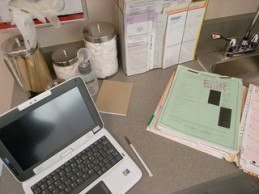In the history of healthcare information technology (HIT), there is clear evidence that technology systems have been designed to provide individual solutions, instead of considering a provider’s workflow holistically. In the late 1980’s and early 1990’s, practice management (PM) systems offered medical practices the opportunity to automate their day-to-day operations. Then the electronic health record (EHR) became mainstream in the late 1990’s and early 2000’s, to electronically store patient
Read More
8 Tips for Urgent Care Clinics to Optimize Revenue & Remain Profitable
As the 2017-18 flu season winds down, it’s become clear that it was one for the record books. With the onset coming early and strong, emergency departments, primary care physicians, and urgent care clinics all over the country were overrun with patients waiting in line to see a doctor.While this had a negative impact on a large portion of the U.S. population, anyone involved in the on-demand healthcare space knows that the flu season and resulting increase in patient volume tends to feed the
Read More
The Patient Experience and…Revenue Cycle Operations? The Two Are More Interlinked than You Might Think.
Think back to the last time you read a negative review about a restaurant. After reading the review, you probably dismissed the restaurant and considered other places to eat.Now, imagine you’re a patient considering options for an outpatient procedure and you came upon negative reviews about a provider. Chances are, you probably skipped that provider and opted for a consult with someone else. As providers, how can we fix this? Now, more than ever, patient satisfaction matters, especially given
Read More
The Telehealth Movement – Access, Value, Convenience
Healthcare, like all other industries, is experiencing a phase of rapid transformation due to the increased use of technology.“We’re entering a second wave of health innovation, where new business models, exciting technologies, and exciting leaders will emerge,” said Unity Stoakes, Co-Founder & President, StartUp Health in the company’s 2017 Year End Report. Telehealth, or the provision of healthcare via telecommunication networks, is not new – but it’s now becoming a hot suite of
Read More
Solving the Patient Access Labor Supply Challenge
Providers are struggling to stay profitable while also striving to keep patient satisfaction from being negatively impacted. Denials are on an upward trend, payors are becoming tighter around what is demanded of the providers, and patients are being squeezed to pay more out-of-pocket with the ongoing shift to self-pay and high-deductible plans.What many may not realize is that these financial challenges rear their head from the moment the patient walks through the door or schedules an
Read More
AI & Machine Learning is Shaping the Future of Healthcare Delivery
An Accenture report was released at HIMSS18 with a bold prediction: the healthcare artificial intelligence (AI) market may hit $6.6 billion in the next three years. In 2014, that number was just $600 million, meaning the AI healthcare market could see an eleven fold increase in value in less than a decade.The survey showed that as of 2018, one in five U.S. consumers have already used healthcare services “powered by artificial intelligence,” and many are open to AI clinical services, like
Read More
Apple Health Records Initiative: Peril or Promise?
Health Records is Apple’s new personal health record feature that was announced on January 24, 2018 as part of the iOS 11.3 update. Health Records will collect and compile patient-generated data, such as steps walked in a day or hours slept, together with information from the patient’s electronic medical record (EMR) if the user is a patient at one of now nearly 40 participating hospitals. UNC Health Care Chapel Hill, Johns Hopkins Medicine, and Stanford Medicine are three health systems have
Read More
Off-the-Shelf Hospital Apps: What Product Developers Do & Don’t Care About
There’s definitely something tempting about out-of-the-box software products, no matter their type or industry. Their costs are always definite, as you pay for the already complete development processes. They give you the solution you need in a matter of a few days instead of months. What’s more, you don’t have to spend time and efforts on communication with a vendor, whether it’s a weekly review or daily feedback. However, there’s one great disadvantage: off-the-shelf software can’t meet
Read More
5 Telltale Signs Your Revenue Cycle Management May Need Outside Help
David Gallegos from Change Healthcare discusses 5 signs an organization should consider partnering with an outside partner to support their revenue cycle management (RCM). Are your revenue cycle management (RCM) staff and resources being stretched with the day-to-day challenges required to orchestrate claims, stay on top of regulatory changes and track payments? Are you trying to communicate more meaningfully with patients and collaborate with payers in ways you’ve never had to be
Read More
7 Reasons Why Claims Data Cannot Drive Patient Health Improvements
With the Department of Health and Human Services' decision to tie 90 percent of Medicare payments to value based models by this year, we can expect organizations to move even faster toward streamlining their population health management programs. But a survey from Managed Healthcare Executive notes that only 12% of survey respondents say their organization is using data “very well” and it’s making a “big impact” at their organization, the same percentage as 2016. Obviously there is still a steep
Read More











